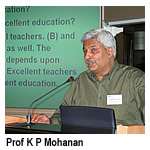“The plaque reminds us that CityU is a centre of learning and teaching. In the past 10 years, we have made quality of teaching and learning the central theme of our university and nobody has better represented that spirit than the names we see here,” said
Professor H K Chang, University President, at the
Teaching Excellence Awards (TEA) Plaque Unveiling Ceremony on 30 April. The Plaque displays all the names of the TEA winners since it was introduced in 1993. The ceremony marked the relocation of the plaque to the entrance to the
Academic Building.
The occasion also witnessed the announcement of the winners of the 2003-2004 TEA which went to Dr Kevin Downing, Senior Lecturer, Division of Social Studies; Dr Mohamed Khalifa, Associate Professor, Department of Information Systems; Dr Joan Leung, Associate Professor, Department of Public and Social Administration; Mr David Santandreu, Lecturer, Division of Language Studies; and Professor Lilian Vrijmoed, Department of Biology and Chemistry.
“The award means a big step forward in my career,” Mr Santandreu said. “The award shows me that all my efforts are worth it and I’m on the right track.” Mr Santandreu believes that by constantly changing and creating new strategies in teaching, by challenging students positively and involving them in projects, he has helped foster students’ commitment to learning.
To second-time winners, Dr Khalifa and Professor Vrijmoed who received
their first TEA in 1997-1998 and 1996-1997 respectively, teaching excellence is a continuous process. “The award is a starting point for new ways of improvement,” Dr Khalifa said. He sees the whole process of going through the TEA exercise as an opportunity to reflect on his teaching. “My improvement in the past years, I believe, is based on what I went through during my last TEA exercise.” Dr Khalifa adopts a collaborative approach by integrating three learning communities—the teachers, students and the profession—in his teaching.

While Dr Leung felt honored to receive the award, she was also grateful for the support of University policies, and the cooperation between academic and non-academic departments and students, without which quality teaching could not be achieved. Dr Leung believes that teaching and learning are complementary, and she has improved in the process of teaching her students. In addition to advancing students’ knowledge, she believes that teachers should also be caring. “Teaching with the mind and heart is important,” she said.
Dr Downing concurred, “The award should also belong to the colleagues who worked with me and I would like to thank the University for dedicating to promoting quality teaching.”
CityU introduced the TEA with an aim to recognize and reward distinguished teachers and to emphasize the University's commitment to supporting a teaching culture. To date, 59 awards have been given out in recognition of the efforts of CityU’s excellent teachers. The TEA selection process has become more rigorous through the years. “In addition to emphasizing methods and strategies of teaching, we also focus on the assessment of learning outcomes,” said Chair Professor S Kitipornchai, Panel Chair of the TEA.
In addition to internal academics and student representatives, the Selection Panel included two external members: Ms Denise Chalmers, Director, Teaching and Educational Development Institute, University of Queensland, Australia; and Professor K P Mohanan, Deputy Director, Centre for the Development of Teaching and Learning, National University of Singapore. The participation of these two distinguished people in the field of teaching and learning on the Selection Panel serves as an international benchmark of the high quality of teachers in CityU, Professor Kitipornchai remarked. “I’m really proud of the winners who have come through this rigorous exercise and they truly can be regarded as winners of international teaching quality.”

“I was very impressed by the commitment and rigor of the deliberations. I’ve learned a great deal from it,” Professor Mohanan noted. Ms Chalmers observed, “The selection process is rigorous and it considered several aspects of teaching.” In addition to serving on the Selection Panel, Ms Chalmers and Professor Mohanan spoke at the Symposium on Teaching and Learning organized by the
Quality Assurance Committee which took place immediately after the plaque unveiling ceremony.
In his talk on “Teaching for Learning”, Professor Monhanan reviewed the learning outcomes beyond “knowledge” and “the application of knowledge” touching upon the ability to learn on one’s own, to justify one’s knowledge claims and opinions, and to clearly and precisely articulate one’s claims and opinions, as well as one’s justification and critical evaluation of them, and how to incorporate them into classroom activities, assignments and examinations at an individual level and in educational policies that shape the practices of teachers.
In her talk on “Assessment for Learning”, Ms Chalmers explored the issues and questions related to assessment practices. While there has been a definite move throughout higher education towards a focus on the quality of student learning through increasing flexibility and student-centered teaching practices, there have been relatively few changes in assessment practices. Ms Chalmers inspired participants to rethink their way of conducting assessments, especially if teachers are seriously committed to student learning.

The Symposium, as one of CityU’s 20th anniversary celebration activities, illustrated the University’s commitment to continue its quality assurance culture which has been highly commended by the University Grants Committee (UGC) in the Teaching and Learning Quality Process Reviews. “The landscape of higher education in Hong Kong has changed. Many of our programmes have changed from government funded mode to a self-financing mode,” Professor Chang said at the Symposium’s opening ceremony. “And if we are not careful about quality assurance in this transformation, we could undermine the quality of education in the community.” The Symposium, which provided an opportunity for experience sharing and exchanges, attracted over 100 educational professionals from CityU and other local universities and tertiary institutions.









